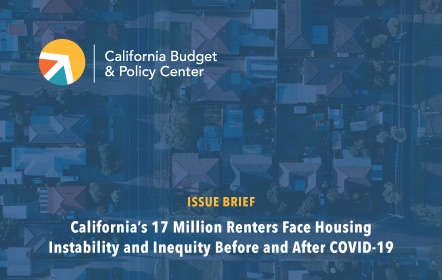January 22, 2021 - SACRAMENTO — A new report by the California Budget & Policy Center highlights the vast housing instability and economic-racial inequity for the state’s 17 million renters before and after  COVID-19, and why state and federal policymakers must urgently act on policies to extend eviction moratoriums and rental assistance.
COVID-19, and why state and federal policymakers must urgently act on policies to extend eviction moratoriums and rental assistance.
The new report — California’s 17 Million Renters Face Housing Instability and Inequity Before and After COVID-19 — breaks down who are among the state’s children, families, and individuals living in renter households and at increased risk of housing instability and homelessness. The report findings also point to why urgent measures in Governor Newsom’s proposed 2021-22 budget, such as extending the state eviction moratorium beyond its current expiration date of January 31, are critical for the 44% of California residents who live in renter households.
Among the findings in the report:
- Nearly 800,000 California children ages 0 to 5 — approximately 30% of all young children in the state — live in renter households that are housing cost-burdened, paying more than 30% of income toward housing.
- About half of Black children ages 0 to 5 live in renter households with unaffordable housing costs, as well as more than one-third of young Latinx children, compared to 17% of young white children.
- A majority of the lowest-income renter households — 6 in 10 — had severe housing cost burdens, paying more than half of their income toward housing before COVID-19.
- Approximately 3 in 5 Black Californians and over half of Pacific Islander (54%) and Latinx Californians (53%) live in renter households.
- Nearly 6 in 10 Black individuals in renter households (58%) and more than half of Latinx renters (52%) were housing cost-burdened — compared to 44% of white renters and 42% of Asian renters before COVID-19.
“Exclusionary and racist employment and housing policies have blocked generations of Californians of color and those in low-income households from educational opportunities and higher-paying jobs that enable families to build the financial assets needed to have stable, affordable housing,” said Monica Davalos, research associate with the Budget Center and a report author. “Policymakers must recognize the severe situation our communities and state are in with millions of Californians strained to pay for housing.”
While the federal COVID-19 relief bill enacted in December provided approximately $2.6 billion in assistance available for rent and utility expenses for California renters with low incomes, the report findings and other research show Californians will need ongoing economic support for months and even years to come.
”The governor’s proposed budget estimates the jobs our state has lost may not come back until 2025 at the earliest. Meanwhile, rent will still be due each month. We know too that Black and Latinx workers and their children are struggling the most to pay for housing and food because of lost income related to COVID-19,” said Sara Kimberlin, senior policy analyst with the Budget Center and a report author. “This all underscores why urgent and ongoing support for renters is very much tied to the state’s recovery.”
Federal relief has been significant in helping Californians pay for basic needs and the state avoid an even deeper recession. However, undocumented Californians and mixed-status families have been blocked from federal support. The governor’s proposed Golden State Stimulus plan would provide these families some much-needed financial support. Policymakers can further increase this support for California’s undocumented residents and their families and help more Californians be able to pay for rent, food, or other basic needs as the pandemic continues.
“Families are blocked from help because of nativist and anti-immigrant policies set up to inhumanely exclude and degrade all those who are foreign born, neglecting them support even during a global health crisis,” said Aureo Mesquita, research associate with the Budget Center and a report author. “Proposals like the Golden State Stimulus are a start. Now it’s time for policymakers to consider what level of support Californians of different races and from different places, native or newcomer, truly need to live and thrive in our communities. ”
Read the full report here: https://calbudgetcenter.org/resources/californias-renters-face-housing-instability-inequity-covid-19/
The California Budget & Policy Center engages in independent fiscal and policy analysis and public education with the goal of improving public policies affecting the economic and social well-being of Californians with low and middle incomes. Support for the Budget Center comes from foundation grants, subscriptions, and individual contributions.
Source: California Budget & Policy Center








